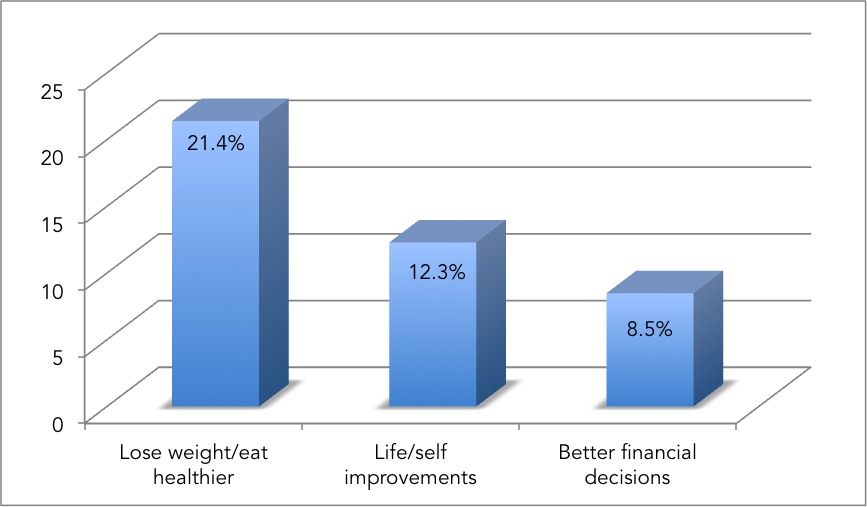With the beginning of every new year comes the traditional “things I want to accomplish in the coming 365 days”. Lists are prepared, goals set and spirits are high that by the end of the year, goals can be successfully crossed off the list. In 2017, these were the most common intentions people set:

Source: Statistic Brain Research Institute (2017)
While these intentions are undoubtedly well-meant, most peope do not adhere to their ambitious goals – in fact 80% of all resolutions fail by the second week of February. Why? You may ask. Is it a lack of willpower? Dying motivation after the third cheat day in a row?
Actually, most psychologists argue that people are not truly ready to change their habits when setting their goals, which results in a high failure rate. Also, some of the aims are simply unrealistic, which makes it impossible to achieve them both in the short term and the long term.
In order to avoid disappointment when February rolls around, it is therefore essential to not only create SMART goals (read: specific, measurable, attainable, realistic and time-bound) right from the start but also get into the habit of creating habits and sticking to them religiously. Small adjustments that make your life easier – so-called life hacks – are a great help here to ensure that you stick to your intentions with ease!
This article focuses on the most popular intention of every New Year; namely, improving health and well-being, and serves both as a guide and motivational piece in order for you to conquer 2018 and live your life to your full potential this year. You will find the following categories below: • Nutrition • Exercise • Relaxation • Sleep • Social relationships We hope to inspire you in one way or another – and if we do, please share your progress with us on social media, using the hashtag #gocohospitality. We would love to hear from you!
1. EAT REAL FOOD
“Let food be thy medicine and medicine be thy food” – Hippocrates

Eating a diet rich in nutrients (see our blog post on how to clean up your diet here) is not only important to ensure proper bodily functions and processes but also to reduce the risk of many of today’s leading causes of death, including type-2 diabetes, heart disease, stroke and cancer. By eating a healthy diet, we can ensure that we stay fuelled during the day, have more energy for work (studies show that people who eat well are 66% more productive than junk food eaters) and also are able to keep off weight more easily. Even better, health-promoting nutrients in a good diet support our mood-regulating hormones, which means that we are more balanced and happy throughout the day!
Some of the best foods we can consume are (organic) fruits and vegetables, as they are full of antioxidants, vitamins and minerals necessary to create an alkaline state in the body, therefore making it hard for diseases to develop and grow. In addition, we should consume healthy carbohydrates such as whole grain rice, pasta and potatoes; sufficient protein in the form of lean meats, beans and legumes or tofu; heart-healthy fats in the form of omega 3-abundant fatty fish; and leafy greens and other dark green vegetables, as well as plentiful fruits.
To make eating healthier a little bit easier, try the following life hacks:
#1:
While nutritionists still argue on whether breakfast is really the most important meal of the day, there is definitely nothing wrong with starting the day off with a healthy meal. This will fuel your body, set you up for a successful day and also make you less likely to get cravings for unhealthy food later on.
#2:
It is harder to fail when you are prepared! Take two hours off your Sunday afternoon and meal prep for the week ahead. This not only ensures that you have food readily available for the next few days, but you can also control the level of “healthy” from your own kitchen and save yourself money, as buying in bulk is oftentimes cheaper. Triple win!
#3:
In order to eat better, a simple yet often overlooked trick is to fill your plate with as many vegetables as you can from the beginning of the meal. This will automatically leave less room for greasy sauces, fatty meats and unhealthy condiments.
#4:
Eat more often. By eating regularly (every 3-4 hours) you can avoid your blood sugar dropping dramatically, which will prevent you from eating everything in plain sight. Just make sure to not turn your meals into unhealthy snack breaks, which will add unwanted calories and also leave you more sluggish than energetic.
In addition, our bodies need enough water to replace fluids lost during day and night, which is why we should aim at drinking around two litres of water every day. This number may go up when we exercise intensively, are sick or live in hot climates. Our bodies are about 60% water, and by drinking a sufficient amount of the “elixir of life”, we help it transport nutrients, regulate body temperature and digest food properly.
On the contrary, when we are dehydrated, we will experience low energy levels and our cognitive brain functions suffer. Careful! Dehydration occurs with a fluid loss of 1-2% of body weight.
Follow these life hacks to help you stay hydrated:
#1:
If you do not enjoy the taste of pure water, you can add slices of fresh fruits, herbs or a bit of stevia for an extra kick! Get creative with flavours and buy a fruit infuser water bottle, which will keep your water clean and motivate you to drink more. Place it strategically on your desk to constantly remind you to drink during the day.
#2
Sometimes life can be pretty stressful; and then we simply forget to drink. Luckily, there is an app for that! Check out the Apple iTunes store or Google Play Store. You will find plenty of free water reminder apps such as the “Daily Water Drink Tracker and Reminder”
2. EXERCISE REGULARLY
“Fit is not a destination. It is a way of life.”

We humans were made to move. Whether it’s walking, running, jumping, climbing or kicking, our bodies were designed to stay active and our blood to keep pumping to rid the body of toxins naturally. Unfortunately, today’s world is all about convenience, with the average person walking only 4,961 steps a day. People living in pedestrian-friendly cities, like New York, in general average higher step counts – a noteworthy fact for city planners. Interestingly, the study above found that the average step count in a country was not a safe predictor of the country’s obesity rate; however, it has to be kept in mind that the gap between high and low step counts often vary widely.
Exercise should be part of our everyday lives. Not only to keep our bodies fit and strong, but also to decrease our risks of various diseases, reduce our blood pressure and lower body fat. A mix of weight lifting, cardio and resistance training is best, as it works our heart and muscles – a good combination is aerobic exercise like running with some weight training and a few yoga sessions in between. It increases our blood flow, improves our bone density and lowers our stress levels in the best way possible. Many studies have also shown that individuals who exercise have an increased flow of oxygen to the brain (read: better brain power) and sleep better at night.
However, before you freak out about a rigorous workout schedule six times a week, know that exercise is everything that gets your heart rate up and makes you move! This, however, also means that there is no excuse anymore to not exercise, since it is easy to just get your friends together and enjoy an afternoon playing tennis, going hiking or simply strolling around the neighbourhood.
See these life hacks for making exercising even easier and more fun:
#1:
You do not need to spend a lot of money on a gym membership! Video platforms like YouTube have a large variety of free online videos to work out to. These include yoga, Pilates, bodyweight exercises and outdoor workouts.
#2:
If working out alone is difficult for you, join an online fitness community for mental support and social interaction with like-minded people. You will also be held accountable to your goals and can measure your progress against other people’s progress. This will additionally increase your motivation.
#3:
Sign up for a fitness challenge or competition. While that does not mean running a half-marathon in two months’ time as a complete beginner, the goal should be high enough to keep you focused and motivated. Also, working towards a deadline can be an additional push to not give up prior to reaching it. And always remember, goals should be SMART!
#4:
Your vacation time equals relaxing by some sort of water? Why not switch it up once in a while and exchange the beach lounger for bootcamp? Active holidays are becoming more and more mainstream, which translates into an ever-increasing amount of fitness offers – and again, this does not necessarily mean strenuous exercise (nothing wrong with that!). Select a location that offers stunning snorkelling grounds, scenic cycling routes or fascinating horseback trails – whatever gets your adrenaline pumping and eyes shining is probably the right activity for you!
#5:
Cleaning the house, mowing the lawn and going grocery shopping also count:
#6:
While their actual benefits are much disputed in the fitness industry, studies have shown that fitness trackers can be a great tool to up one’s daily step count. People who used such a device walked on average 27% more than people without one, which translates into roughly one additional mile.
3. RELAX
“Relaxation is the art of letting go” – Dan Brule

When was the last time you took a deep breath and simply let go?
Whether it is work, family, health or other issues that keep you awake at night – it is important to learn how to deal with stress, as it will sooner or later impact your health negatively. Studies show that 48% of Americans regularly experience sleeping problems due to stress, and the same amount feel that their stress has increased over the past five years (Statistic Brain Research Institute, 2017). Stress and stress-related factors now cost employers $300 billion annually.
Yet the good news is that stress can be tackled quite easily with small changes to our daily routines. By consciously relaxing, we can manage stress better, counterbalance anxiety and actually improve our health (think better digestion, slower heart rate, stabilised blood sugar levels, sounder sleep quality).
The next time you are feeling stressed, try one of the life hacks below to make you feel better instantly:
#1:
Practice meditation. If you are not yet aware of the countless benefits that mediation has, read our blog post here.
If you are not yet convinced, learn that reviews of 19,000 studies proved that mindful meditation can erase psychological stress.
#2:
What better way to relax than with a massage? Physical touches relax our bodies, our breathing slows down and our heart rate lowers. Tight muscles untighten and our blood pressure drops as our parasympathetic nervous system is engaged (which is responsible for relaxation and digestion).
#3:
They say that friends are the best medicine, and in fact studies have shown that you can majorly relieve stress from laughter with the ones you love. Laughter stimulates the organs, which in turn increases the endorphins released by the brain, making you happy! In the long run, laughter can even improve your immune system and relieve pain naturally. Laughter really is the best medicine.
#4:
Have you ever heard of Japanese forest bathing? ‘Shinrin-yoku’ has gained popularity over the past few years, and simply describes being in the presence of trees. This science behind this therapeutic practice is that when we see green, our minds automatically relax and our pulse lowers. Visit your local park or make time for a trip in nature this weekend!
4. SLEEP ENOUGH
“Sleep is that golden chain that ties health and our bodies together“

Sleep is one of the most crucial components of a happy and healthy life – yet oftentimes underappreciated. While researchers are not completely sure on why we need our shut-eye time, it is clear that without our daily dose of sleep we soon get cranky, irritable and a recent study even pointed out that sleep deprivation is as bad as being drunk!
During our sleep, our system has finally time to fully dedicate all its resources to reenergise and repair our cells and tissues, practice skills that we learned during the day (called consolidation), support our learning and release growth hormones. By sleeping enough, we can actively lower our inflammation levels (if they are high, we are more prone to heart disease, stroke, diabetes and premature aging), strengthen our immune system (a study showed that individuals getting less than seven hours of sleep are three times as likely to get a cold) and control our weight effectively (with good sleep, the body loses more body fat compared to muscle mass).
It is therefore VERY important to make enough room for sleep each night (or day, if you are working in shifts). Generally, experts recommend 7-9 hours in order to keep us healthy and improve our overall quality of life – and by implementing some of the tips below, you will be sure to get a really deep and restful sleep:
#1:
You have been lying in bed for hours and have counted countless sheep? Next time, try a natural remedy in the form of essential oils before hitting the hay to relax your mind. Some of the best essential oils for good sleep include lavender, ylang ylang and bergamot. Spray some on your pillow or apply to your wrists and behind your ears for a more peaceful pillow time.
#2:
Routine is everything. Make it a habit to be in bed by a certain time – our internal clock will find its natural rhythm. The benefit? We are actually tired when we go to bed.
#3:
For deep sleep, put away all electronics roughly one hour before going to bed. Blue light can suppress the production of melatonin (our sleep-regulating hormone), keeping us awake longer than necessary.
#4:
Read a good book or listen to calming music. A great idea is always to take a warm bath as it actually cools down the body temperature, adjusting it perfectly for the night ahead.
#5:
Calculate your ideal sleep time! Each of our sleep cycles lasts for roughly 90 minutes, and in order for us to feel well rested, we should wake up around the 90-minute mark. So instead of sleeping for seven hours straight, our bodies might be happier with getting just six hours or 7.5 hours instead.
5. BE SOCIAL FOR MENTAL WELLNESS
“A true friend is the greatest of all blessings” – Francois de La Rochefoucauld

Identified by the Global Wellness Institute as the “biggest future trend”, mental wellness will establish itself as a key player in the wellness industry in the coming years, with treatment offerings going mainstream in spa and wellness centres. Yet, what does mental wellness really mean? According to the World Health Organisation, mental health is “a state of well-being in which the individual realizes his or her own abilities, can cope with the normal stresses of life, can work productively and fruitfully, and is able to make a contribution to his or her community”.
Studies have long shown that having a strong social support system (in the form of friends and family) can make you live a happier, healthier and longer life – mainly due to the body experiencing lower stress and inflammation levels. Interestingly however, the effects of having sound social contacts also influence brain health, as lower inflammation levels mean a decreased risk of depression and even reduced suicide attempts in populations!
The simple act of having people you love around you helps you relax and increases the level of “happy” hormones, which has a big impact on your mental and emotional wellbeing. Other research has proven that caring behaviours release stress-reducing hormones, which makes friends your best weapon against stress and poor mental health!
Not sure how to improve your social skills or get to know new people? Try some of our tips below:
#1:
Your Sunday night routine includes texting a loved one that you are well and love them? A much better idea is to call them up, and speak to them in person. This will not only bring you spontaneous happiness but also bring a smile to their face – guaranteed!
#2:
Schedule your social time. We are masters in scheduling every work related appointment, making time for it whenever necessary – yet can fall short in time for our friends. Therefore, treat your social life like your work life and set dates that you will not miss!
#3:
In order to meet new people, you need to get out there and find them! Join a tango class, learn how to create your own pottery, learn a new language – and you are sure to meet a variety of people from all walks of life!
Now it is up to you to put some (or all) of these tips above into practice and change your life for the better. And never forget, a journey of a thousand miles begins with a single step (Lao Tzu)!
Again, if we have inspired you please share your experiences with us on social media by using #gocohospitality.
To a happy and healthy 2018!

